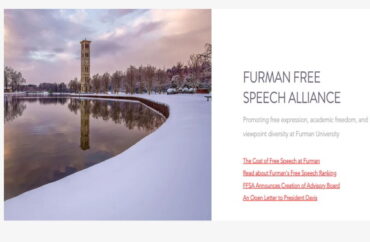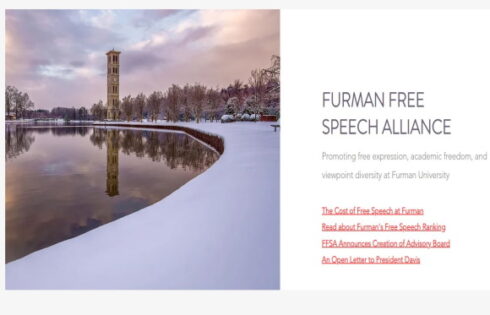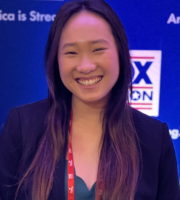
‘I believe the culture at Furman is one of intolerance, but to only right-winged views’
A series of cancel culture incidents at Furman University has prompted some alumni to form a free speech group to lobby campus leaders to allow — and protect — intellectual diversity on campus.
Jeff Salmon said he was inspired to start the Furman Free Speech Alliance to promote free expression, academic freedom, and viewpoint diversity — especially after what he called troubling incidents at his alma mater.
He is actively trying to recruit other alumni to “help Furman make a course correction,” he said.
“Since July I have had conversations with dozens of alumni about the situation and encouraging them to join our effort,” Salmon told The College Fix in a recent telephone interview. “I have had several that have said ‘I’m not giving any money to Furman, I’ve just given up on it…there is no hope.’”
But Salmon said the university is worth fighting for.
“I think people should continue to give to Furman, but give it specifically to things that will enhance education there rather than perpetuate a campus culture of intolerance which has been built up by the administration,” he said.
Salmon, who works in public policy, said his concerns largely began in 2020 after the death of George Floyd.
“I thought there was institutional neutrality at Furman until the George Floyd summer, and then the president wrote a letter, like a letter written by so many other college presidents, in which she asserted that there was systemic racism at Furman,” Salmon said.
President Elizabeth Davis wrote in her May 2020 memo “we uncovered a history of white supremacy among Furman’s early leaders that lasted well into the second half of the 20th century in South Carolina and across the country.”
She continued that the university needed to do more to fight against the “stark, systemic and institutional realities of racial injustice in America that says through words and actions that black lives are expendable.”
In the following years, Furman expanded its diversity, equity and inclusion efforts, adding about five-new DEI-related positions, too many needed for a school of 2,500 undergrads, Salmon said.
In the last year, student Peter Paluszak put up a pro-life display and said he was surrounded and verbally attacked by his peers, and then ostracized by the campus community.
A video posted to YouTube of the incident shows Paluszak standing alone with his pro-life signs as a large, opposing crowd of students screamed offensive comments and profanity.
“After the protest, a few students became actively rude to me any chance they got, but for the most part, people just began to ignore me,” he told The Fix in a recent email about the January 2023 incident. “I became a social outcast to most, and many of my good friends became mere acquaintances.”
Paluszak said there is a need to address growing intolerance even as DEI expands at Furman.
“I believe the culture at Furman is one of intolerance, but to only right-winged views,” he said, adding that conservative views are treated like discrimination.
“Most students, faculty, and a large part of the administration propagate this intolerance by pushing left-winged ideals and beliefs, while shunning and silencing right-winged beliefs,” said Paluszak, who graduated from Furman in 2023.
“…In my time at Furman, I believe that the implementation of DEI practices have only caused more intolerance on campus. I believe this is because the DEI practices on campus have pushed for diversity by spreading a message of victimhood and oppression, rather than skill, worth, and merit.”
Salmon said what happened to Paluszak is not surprising given two high-profile cancel culture incidents over the last year there as well.
In one case, conservative scholar Scott Yenor gave a guest lecture at the school in February 2023 that was met with protests by students, the Furman University Democratic Socialists, and others, the Paladin student newspaper reported.
There have been mixed reporters about the protest, with some calling the demonstrations vulgar and Yenor himself pointing out students flipped him off and he needed police for protection.
“If students were interested in ideas, then Furman police wouldn’t have had to whisk me away through the back entrance to a waiting police car,” he wrote in a letter to The Wall Street Journal.
Following Yenor’s experience, conservative author Mary Eberstadt withdrew from speaking at Furman University, citing a cancel culture campaign on campus that engaged in smears against her.
President David, in response to the high-profile incidents, argued they were blown out of proportion and that free speech is supported on campus.
Salmon told The Fix he isn’t so sure. The Furman Free Speech Alliance was formed in early 2023 in the wake of the incidents.
A co-founding member of the alliance is Tom Davis, who graduated in the same cohort as Salmon. Others that serve on the advisory board are graduates Christian Alexandrou and Ravenel Curry, as well as John Cline, listed as a parent, according to the group’s website.
Salmon said the group rejects the argument that Furman is systemically racist. Goals of the alliance are to lobby leaders to ban required DEI statements in hiring and toss the “Bias Reporting Incidence System,” its website states.
Some members of the alliance have met with campus leaders to express their concerns. So far, Salmon said, Furman doesn’t seem to want to change.
“I didn’t think that [Davis] or the board fully appreciated what the DEI community understood itself to be. The self understanding of the DEI community does not include the diversity of viewpoints, political viewpoints, or any kind of viewpoint,” he told The Fix.
MORE: Conservative author withdraws from speech at Furman: ‘You can’t cancel me, I quit’
Like The College Fix on Facebook / Follow us on Twitter





Please join the conversation about our stories on Facebook, Twitter, Instagram, Reddit, MeWe, Rumble, Gab, Minds and Gettr.